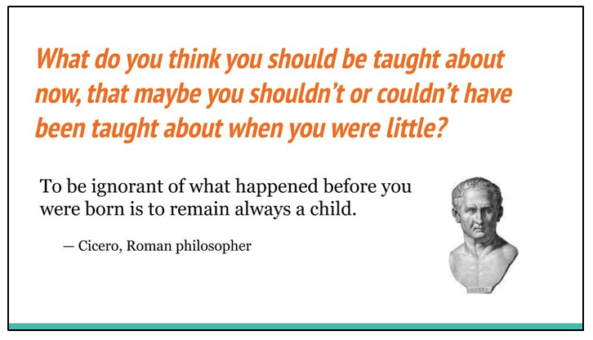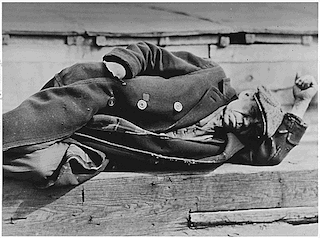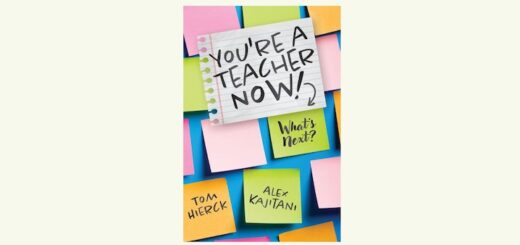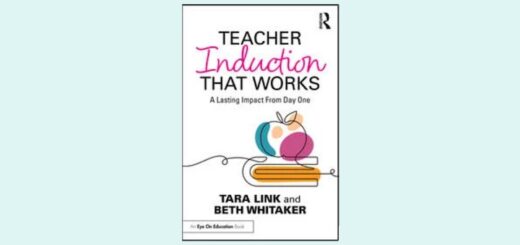What We Can Learn While We’re Grading
A MiddleWeb Blog
 I have never met a teacher who enjoyed grading. It’s the worst part of the job: the repetitiveness, the sheer amount of it, the cringing when so many students misunderstand the same thing….
I have never met a teacher who enjoyed grading. It’s the worst part of the job: the repetitiveness, the sheer amount of it, the cringing when so many students misunderstand the same thing….
Grading is unavoidable, but there are things we can do to avoid the cringing.
When you grade, keep a notepad handy. As you see some of the same errors, over and over again, jot down notes about how to change things for next year.
The process seems simple, even obvious, but it can be revelatory. Over time, it can make you a more effective teacher as you turn the grading process into a form of personal PD.
The evolution of an assignment
Let me take the first paper my 8th grade American history students write for me as an example. I start the year off with a discussion about why we study history, choosing from a list of quotations and proverbs. The first writing assignment is a short paper in which students choose a quotation and explain it.
Can you imagine how awful those first papers were the first year I assigned this – with little more instruction than what I describe above? One of the quotations was from the Roman philosopher, Cicero, and says, “To be ignorant of what happened before you were born is to remain always a child.”
Here is a typical beginning from one of those early papers:
I picked quote 4. It says that if you don’t know history you will be like a child. So it means that if you don’t know history, you will be like a little kid. History makes you grow up.
Paper after paper started, “I picked quote 3,” or “I’m going to write about quote 5 for this paper.” Ugh.
So the first thing I changed on my instructions was about how to begin the paper. The instructions now tell students to start by mentioning the quotation; no need to say which quotation they are picking. I give an example:
Cicero, a Roman philosopher, once wrote that “To be ignorant of what happened before you were born is to remain always a child.” In other words, Cicero believes…
The other problem I saw the first year was length. An embarrassing number of papers were no more than a few sentences.
So the next year I gave guidance. Three paragraphs. The first one should explain the quotation, the second should give an example from history or your own life, and the third paragraph should explain what you like/dislike/find interesting about the quotation. I developed this “outline” from what I saw on the stronger papers.

The next-year papers were longer and better, but still problematic. I took notes while I graded them. I realized that the papers in which students gave an example from history were significantly better than from their own life. I had thought that having an example from their own life would help them “relate” and make the assignment more appealing. I was wrong.
One of the quotations was a Russian proverb, “Dwell on the past and you’ll lose an eye. Forget the past and you’ll lose both eyes.” I would get sentences like this:
When I lost a baseball game, I would get really upset and then not play so well in the next game. I “dwelled on the past.” But then I learned from the mistake so I didn’t dwell on it but moved on.
Yes, pretty awful. So I changed the instructions again. Now students would be required to give examples from history. I made connecting it to your own life optional, and many students did, but this time, their examples were stronger because they first related it to history.
I got lots of examples about not forgetting our nation’s experiences with slavery and discrimination, but not “dwelling” on them and preventing us from moving forward as a nation. And I gave them instructions about not taking the quotation quite so literally. I wove this into our discussion of the quotations in class.
Four years later . . .
This year was my fourth year giving this assignment. The papers were much better. But still, I cringed when I read sentences like this:
I think Eugene Debs did a great job of making this quote.
This was from that third paragraph in which students were supposed to write what they liked/disliked about the quotation or what they found interesting. Many 8th graders really don’t have a clue about what to do with that instruction and write sentences like the one above. So this year – with over 400 essays under my belt – I think I finally figured it out.
In our class discussion prior to assigning the essay, I had asked questions about each of the quotations, to extend their thinking about the meaning of them. I turned each quotation into a slide which we discussed. Here is the one about the Cicero quotation:

During our class discussion, this quotation never failed to elicit perceptive comments and questions about what students had learned in grade school versus what they learned last year in 7th grade and what they thought they could handle now in eighth grade. So why, I wondered, could they not put that into their papers?
Then I read Helen’s paper. In her 3rd paragraph she wrote that she found Cicero’s quote interesting when she reflected on what she had learned about the Pilgrims in grade school, compared to what she learned last year. Aha!
Next year’s instructions will tell them to reference the “orange” question from our discussion that goes with the quotation. And then connect it back to our overall question for the lesson, “why study history?” I will put the “orange questions” into the assignment. I am confident that next year’s papers (finally!) will be satisfying to read.
We have to watch for our own mistakes
Sometimes it takes a long time and lot of painful grading in order to figure out the mistakes. You have to be open to your own errors in the assignment. When you see kids all making the same kind of mistake, you need to notice that maybe it’s how you phrased the question, or the emphasis you gave to a certain point in class, or your lack of emphasis on another crucial point.
Another example: I noticed a common problem students are having with a reading assignment. See the excerpt below from Caroline Bird’s five-page paper “The Worst of Times” about the Great Depression.
By the charitable standards of the rich at that time, these people were regarded as the “deserving poor,” as distinguished from the undeserving poor, who were thought to be unwilling to work or to save.
If the “deserving poor” had been few, charitable help might have sufficed. But there were too many, and more all the time. (Source)
Here was the question I asked:
- As the Depression went on (and on), how do these terms show that people began to think differently about why it was that so many people were poor? In other words, is there a difference between blaming poverty on the poor and blaming poverty on conditions beyond the control of the individual? Which term, “deserving” or “undeserving poor” became more popular, do you think, as a way to explain the widespread poverty of the 1930s? Why?

Franklin D. Roosevelt Presidential Library and Museum: photo by Lewis W. Hine. [Public domain]
Last year, after grading another 120 responses to this question, I finally had the light bulb moment: ask it as two multiple choice questions!
We so often save multiple choice questions for tests, but they are great to use in class, too. Obviously, a whole homework assignment of these is too easy to cheat on, but this is an in-class assignment. So here is my draft for this year, based on one student’s good answer and many students’ wrong ones:
Which of the following explains what the author means about the term “deserving poor”?
a. People who deserved to be poor because they had made bad choices.
b. People who deserved to be poor because they were lazy and didn’t want to work.
c. People who were poor because they had low-paying jobs.
d. People who were poor because of overwhelming conditions in society that affected many.
So the term “deserving” refers to
a. whether or not someone deserved to be poor.
b. whether or not someone who was poor deserved help.
This solves my dilemma: this year students will (likely) be able to understand the issue, but instead of struggling to find the words, they can recognize the answer in mine. Are these lower level questions? Yes, of course. But this is a check-in to help them understand the reading.
The point of reading Bird’s article is to recognize how people’s notions of the cause of poverty changed during this time. They are not at the understand or evaluate part yet. Rather than mark half my students’ papers wrong on this question, I have now created questions that will help most of my students get it right.
Grading is all about the learning
Including our learning. So keep a notebook or scratch paper next to you or have an open Google Doc and take some notes. If you’re like me, you’ll save those notes for the future, as a record of your progress in fine-tuning your assignments and your teaching.
On the down side, approaching your grading with a “how can I make it better” attitude will make it take longer. On the upside, you will become a better teacher, your students will learn more, and the future “You” will find the inevitable hours of grading a lot less cringeworthy.


































Very good article. As a Special Ed teacher, I see many of these same issues with my students when they write. This is a great way of showing that teachers can make slight changes to their directions which help students to produce much better work.
The example about how to use multiple choice questions is an excellent idea!
Thank you so much, Scott. I have found the secret is to make the changes right away. Just last week, students were working on an assignment and lots of them asked me the same question, so I realized I needed to tweak something.
I love using multiple choice questions on in-class assignments and readings. Many students read at a higher level than they can write, so this enables them to read complex material and check that they understand it. Also, when going over readings in class, it gives every student a chance to answer before I call on one student to share an answer.